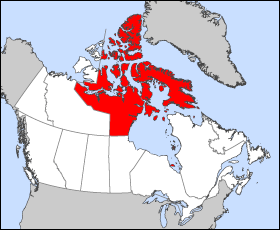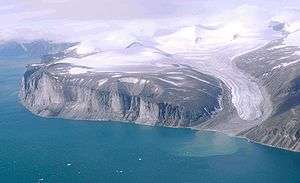Nunavut
Nunavut is a territory in northern Canada which contains Canada's northernmost lands. With only 37,000 inhabitants, Nunavut covers a land area larger than Mexico, divided between mainland North America and an archipelago in the Arctic Ocean.

Most of the people there are part of an indigenous group called the Inuit. They have historically been called Eskimos, but this word is no longer used in Canada, and may be considered offensive by some. Also, many people mistakenly call individual people Inuit; the singular is Inuk ("he is Inuk" vs "they are Inuit").
Cities
The Inuktitut name is in italics.
- 🌍 Iqaluit – capital and largest settlement of Nunavut (Note: don't spell it "Iqualuit")
- 🌍 Pangnirtung (Pangniqtuuq) – Gateway to the Auyuittuq National Park
- 🌍 Resolute (Qausuittuq) - On the shore of Resolute Bay. The second-most northern community in the world and a cultural tourist attraction. Flights available to Resolute on Cornwallis Island can be taken from Iqaluit and Rankin Inlet.
- 🌍 Igloolik
- 🌍 Rankin Inlet (Kangiqliniq)
Other destinations
- 🌍 Alert – the world's northernmost settlement
- 🌍 Baffin Island (Qikiqtaaluk) – Canada's largest island, in the eastern portion of the territory of Nunavut
- 🌍 Ellesmere Island (Inuit: Umingmak Nuna, "land of muskoxen")
- 🌍 Ellef Ringnes Island – the land nearest the geomagnetic north pole, which used to pass through the island.
- 🌍 Devon Island (Inuit: Tatlurutit) – the world's largest deserted island... with a cemetery, the northernmost in the world
- 🌍 Qausuittuq National Park on Bathurst Island
- 🌍 Quttinirpaaq National Park on Ellesmere Island
- 🌍 Sirmilik National Park on Baffin Island
- 🌍 Ukkusiksalik National Park near Repulse Bay
Understand
Until the end of World War II, when the Canadian government began to realize its strategic importance, the Canadian far north was seen as a barren and desolate place, inhabited by indigenous peoples and containing vast mineral resources that had (and have) yet to be exploited. In 1982, after much debate and argument, it was decided to divide the Northwest Territories into two parts, one called Nunavut and the other retaining the name "Northwest Territories". On April 1, 1999, Nunavut came into existence.
Nunavut means our land in Inuktitut, the language of the Inuit. The official languages are English, French, Inuktitut, and Innuinaqtun.
It is one of the most sparsely populated regions of the world. The immense territory includes most of Canada's Arctic Islands, from Baffin Island in the territory's southeast, where the capital Iqaluit is located, to Ellesmere Island a few hundred kilometres from the North Pole. The territory also includes all of the islands in Hudson Bay.
Talk

Around 65% of people living in Nunavut speak Inuktitut as a first language, and the language is co-official with English and French in the territory. Inuktitut is the traditional language spoken by the Inuit people, and is closely related to Greenlandic. It is a somewhat hard language to learn for the English speaker, and most English speaking people won’t even be able to read it because it is written in its own unique script. Though most Inuit probably speak English, it would be a good idea to learn a few key phrases or bring a Inuktitut phrase book along. Learning the script in any case is relatively easy to do. French may also be useful, though not necessary. In the more remote places, Inuktitut may be necessary. Public signage is generally bilingual in Inuktitut and English.
Get in
Access is only by air - there is no road or rail from the south, and consequently prices are rather expensive owing to the difficulty of shipping goods in. Cargo vessels do make the trip up to Iqaluit by sea in the summer months, but there are no passenger vessels that ply these routes.
Starting in 2020 there is talk of a Ferry Service operating from Happy Valley-Goose Bay (Labrador) to Iqaluit. The Iqaluit port necessary to accommodate larger ships began construction in June 2018. Stay tuned.
Get around
In the smaller communities (less than 3,000), ATVs and trucks are used during the short summer (when there is no snow).
In the winter, snowmobiles are the main way of getting around. Dog sleds are also used but owning and maintaining a dog team can be a very costly endeavour. Getting to and from the different communities can only be done by air there are no roads linking the different population centres in the territory.
See
Do
Eat
Some towns may offer small restaurants or coffee shops.
Try some traditional Inuit food, such as raw seal meat. For many Inuit, hunting is still the primary way of acquiring food, so many northern foods such as Arctic char and caribou meat can be bought from local hunters and cooked.
The main grocers are Co-op and Northern, a common grocery for Northern Territories. Because all food must be shipped in from planes, be prepared to pay unusually high prices for perishables, such as milk, fruit, and vegetables.
Drink
In many places in Nunavut there is a local law prohibiting all alcohol. Given the high rates of addiction and suicide in many places, communities have felt the need to adopt this extreme position. Do not bring any alcohol into an officially dry community, as you can exacerbate the local problems with alcohol abuse and even cause a person's death.
In other communities, local bars are permitted to operate. There are no local liquor stores outside Iqaliut; a warehouse in each of Rankin Inlet and Iqaluit will ship hard liquor outside the community but this must be ordered in advance.
Sleep
Stay safe
There is no 9-1-1 emergency number in Nunavut. Use the local seven-digit numbers to reach individual emergency services in each community.